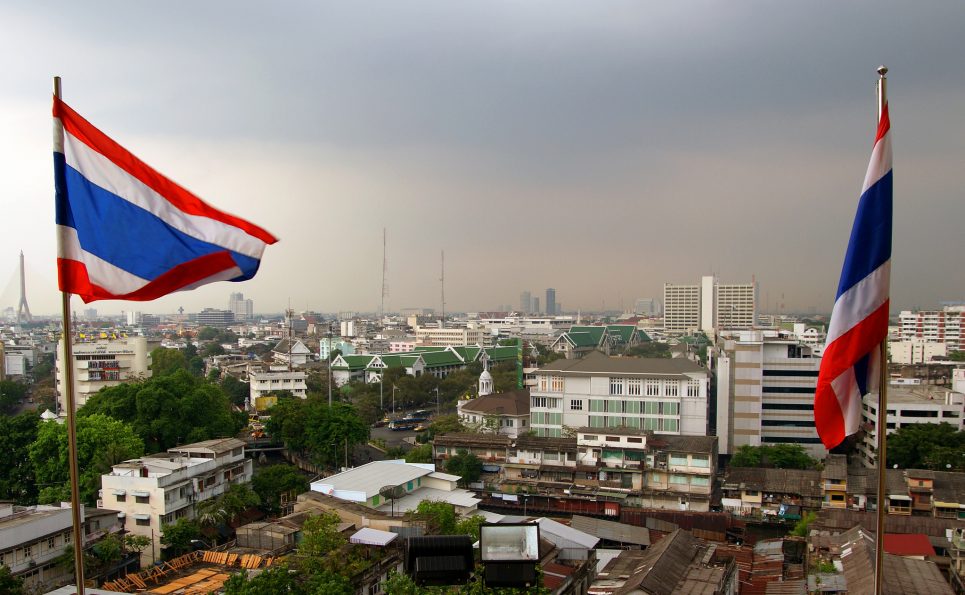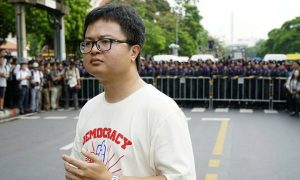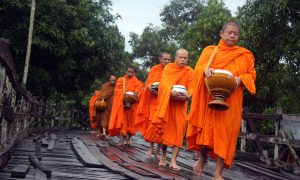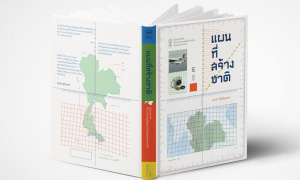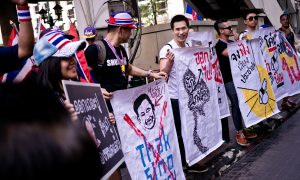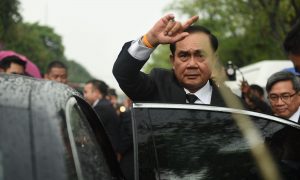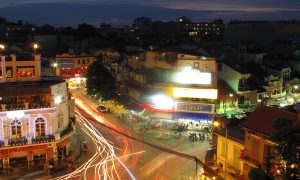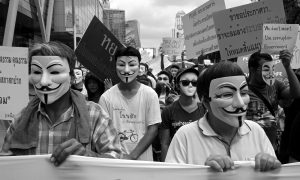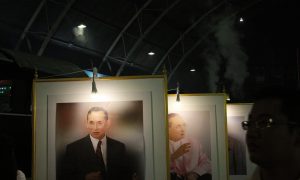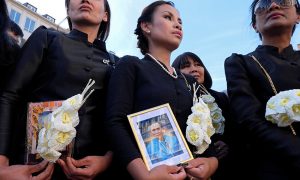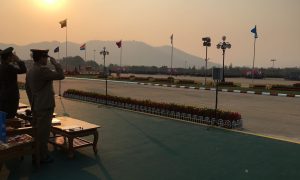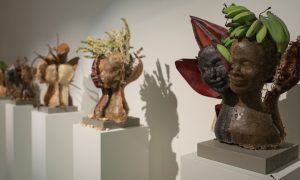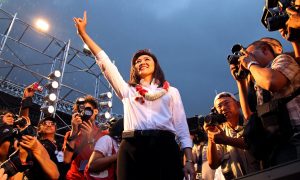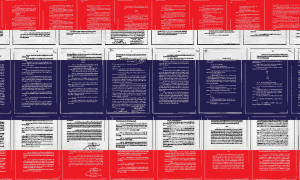Part two of Anon Chawalawan's compilation of the activist inventiveness that has survived the NCPO's four-year rule.
Marrying the Thai monarchy and modernity
While the royal wedding in the United Kingdom was partly extolled in Thailand as a symbol of the British monarchy's adaptability, the royalists’ perception of the Harry-Meghan wedding reflected a desire for their own monarch to be more absolute.
Purging the Thai Sangha
The persecution of one of the junta's most outspoken supporters, Buddha Issara, demands explanation
Sandwiches, 1984 and wristwatches: four years of the NCPO, four years of creative resistance—part one
สี่ปีคสช.: สัญลักษณ์และประดิษฐกรรมแห่งการท้าทายอำนาจรัฐทหาร Activists never intended to use sandwiches during protests—it was the authorities themselves who seized upon sandwiches in 2014, making an unintended contribution to anti-authoritarian emblems.
The Khon Kaen Model: eschewing Bangkok-centric development
ขอนแก่นโมเดล: ไม่ยอมซ้ำรอยอนาคตแบบ "กทม." Public services infrastructure in Khon Kaen is being funded and spearheaded by the Khon Kaen Think Tank (KKTT), a group of the province's 20 leading businessmen.
Exposing Victoria’s Secret—and the NCPO’s graft
The raid against Victoria’s Secret was orchestrated by a group within the state that is opposing the growing influence of the Kampol–Chai–Somyot network.
Thailand Mapped กำเนิดเมืองไทยจากแผนที่
‘Thainess’ only truly laid down its roots at the end of the 1970s. ความเป็นไทยหรือการเป็นคนไทยเพิ่งจะลงหลักปักฐานจริงๆก็ในปลายทศวรรษ 1970 เท่านั้นเอง
A conversation with Thanathorn, Future Forward Party founder
Thanathorn has made clear that the Future Forward Party has no intentions of being a Pheu Thai shadow.
Southeast Asia’s middle classes and the spectre of authoritarianism
Geopolitics is a factor in the resilience of authoritarianism in the region. Often ignored, though, is the enduring pull of anti-democratic politics for the middle class.
From battlefield to marketplace on the Thai–Myanmar border
Thai–Myanmar relations are on the up. But what happens to the large and still-marginalised migrant communities in Thai border towns like Mae Sot?
Perspectives on the Past at New Mandala
Welcoming the University of Sydney's Southeast Asian history bloggers to New Mandala.
Claudio Sopranzetti on ‘Owners of the Map’
New Books in Southeast Asian Studies talks to Claudio Sopranzetti about his monograph on the political role of Bangkok's motorbike taxi drivers.
Thailand in 2018: no neat exit strategy for junta
The status quo isn't sustainable, but none of the likely exit strategies for the junta will give it what it wants.
Introducing the Association for Mainland Southeast Asia Scholars (AMSEAS)
New association "seeks to foster and facilitate opportunities for the advancement of research and knowledge relevant to Mainland Southeast Asia."
Rethinking Southeast Asian civil society
It’s past time for us to ditch simplistic ideas of “civil society” and its relationship with democracy in the region.
Two critical takes after the royal cremation
Patrick Jory and Tyrell Haberkorn on the cremation of King Bhumibol.
Southeast Asian cyberspace: politics, censorship, polarisation
The internet is both a factor in, and a victim of, the region’s crisis of democracy.
Farewelling King Bhumibol in Munich
Snapshots from the Thai community's marking of King Rama IX's cremation.
Two Thai views on the Royal Cremation
Two Thai scholars on what the weekend's cremation of King Bhumibol signifies for Thailand.
Old dominance, new dominoes in Southeast Asia
Democracy in the region finds itself in dark days. Can anything save it?
Posing with the king’s body
Some thoughts on the paradoxes of kingly imagery and (in)visibility in the age of Vajiralongkorn.
Capturing Yingluck
Nick Nostitz reflects on photographing the political rise and fall of Thailand's first female PM.
A year after referendum, only bad news about Thailand’s constitution
The new constitution leaves booby traps for any incoming civilian government.
 Facebook
Facebook  Twitter
Twitter  Soundcloud
Soundcloud  Youtube
Youtube  Rss
Rss 